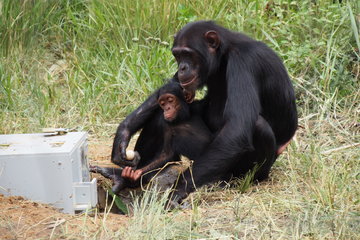Fathers are no role models
Female zebra finches do not only differ in the way they chose their mate but also in their preference for a partner
Scientists from the Max Planck Institute for Ornithology in Seewiesen investigated the influence of heritability versus sexual imprinting on mate choice by observing over 350 zebra finches. How female zebra finches chose their male is partly heritable, according to the scientists. However, the type of male the females prefer is neither determined by genes nor by early rearing effects (published in Evolution, January 11, 2010).

As in most animals, it is the zebra finch female that chooses the mating partner. Thereby, each female has her own individual preference - not different to us humans. These mating preferences can be heritable or they can result from sexual imprinting. This means for example, a female prefers a male that resembles her father. Scientists from the Max Planck Institute for Ornithology in Seewiesen investigated for the first time the relative importance of the two factors for mate choice.
The researchers used an elaborate experimental design to separate the influence of genetically determined preference and the experiences made in the early life phase. More than 350 zebra finch chicks of one generation were raised with unrelated foster sisters from unrelated foster parents. This is why the researchers were then able to compare mate choice and mate preference of genetic sisters and foster sisters. When the zebra finches reached sexual maturity, the females could choose between two unrelated males in a set of experiments.
The Max Planck researchers found that the choice behavior of zebra finch females is partly influences by genes: genetic sisters chose their partners in a similar way regarding their activity pattern, the time spent with a male and the proportion of visits of the different males. Regarding the preference functions - i.e. which male to prefer - the researchers did not find any influence of genes or sexual imprinting. Both, the genetic and the foster sisters did not show more conformity in their partner preferences than females that are unrelated and raised separately. "So far, both mechanisms have been overestimated as factors for partner preference", says Wolfgang Forstmeier, one of the co-authors of the study. There have to be other explanations for individual partner preference than genetic relatedness or early sexual imprinting. The search for those reasons is a task for the future.












